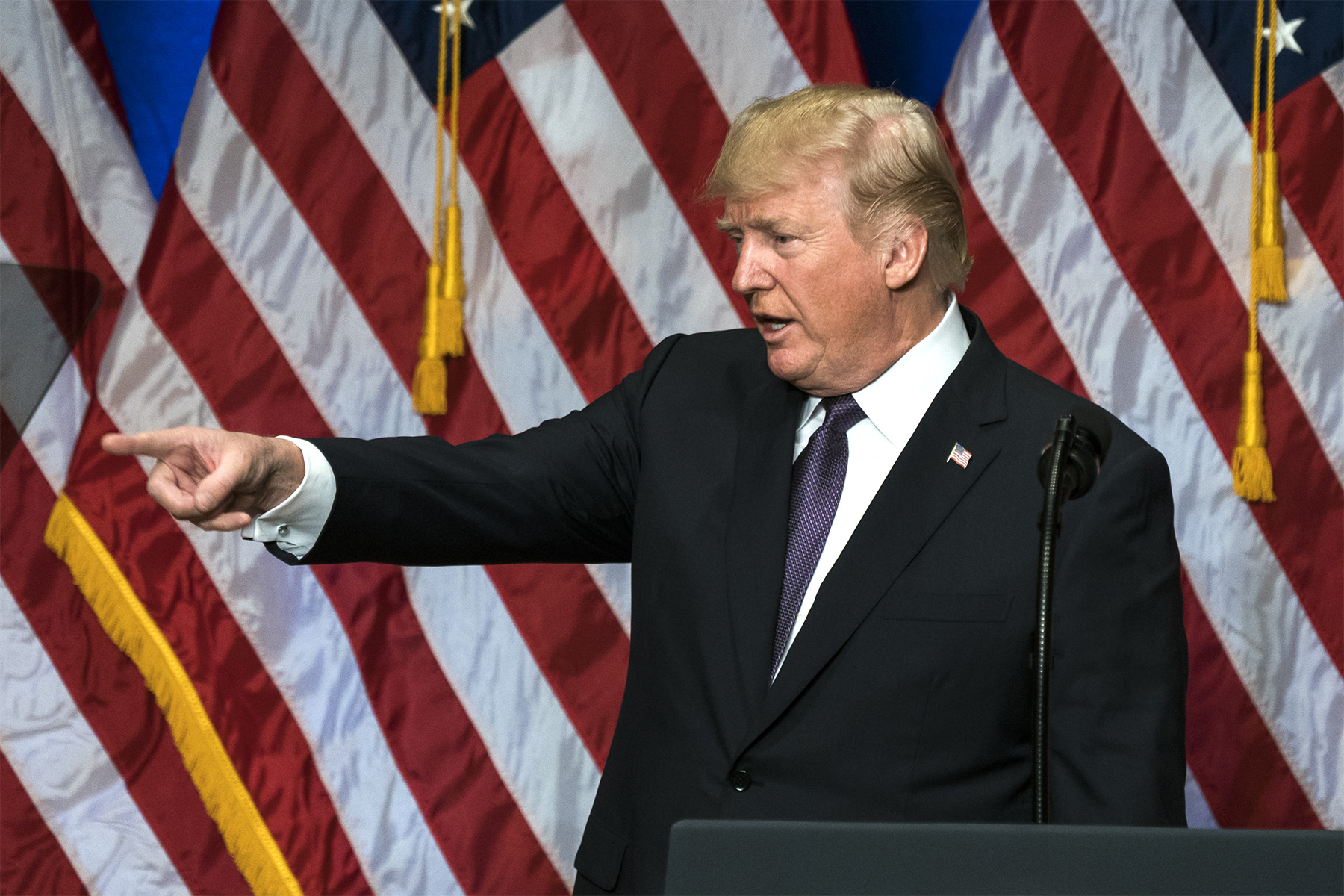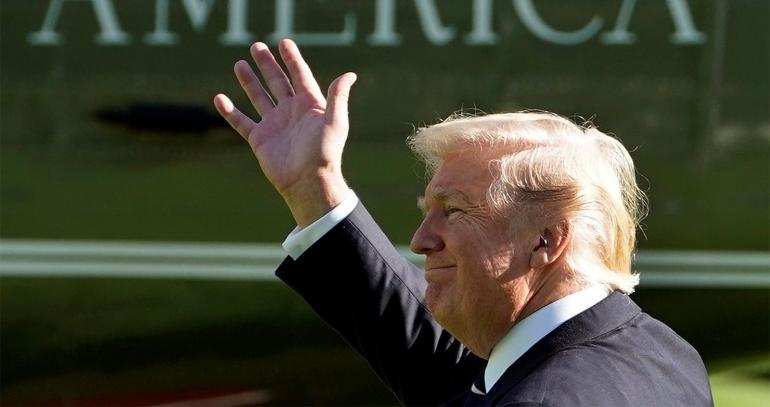Even before Donald Trump’s January 20 inauguration, journalists started speculating about his possible resignation. By the end of 2017, the buzz about his “inevitable” impeachment made headlines; this topic became popular among pundits and politicians as well. Congressmen from the Democratic Party, liberal-minded billionaires as well as cultural and political campaigners called for Trump being impeached. Amidst the probe into Russia’s meddling into the 2016 U.S. presidential election, one cannot rule out this possibility of Trump’s forced resignation, yet is there any legal ground for this? If so, will the U.S. president be able to serve his tenure in the White House until the end?
One of the key arguments in the hands of Trump’s opponents is their claim that Trump creates the conflict of interest situation, because the head of the White House appoints his relatives and close friends to the key positions in the presidential administration (for example, Trump’s son-in-law Jared Kushner is his senior advisor). Moreover, Trump is reportedly getting income from his business both abroad and within the United States, which contradicts the Constitution’s Domestic and Foreign emoluments clause.
Another factor that could hypothetically lead to Trump’s impeachment is the suspicions that he and his close circle have ties with Russia (Washington believes that the Kremlin meddled in the American election process and contributed to Trump’s victory).
Today, as a result of the first year of his tenure, his popularity is decreasing, as indicated by recent polls. He has the lowest approval rankings in the U.S. modern history, with two-thirds of Americans believing that Trump’s presidency dramatically divided the country, according to AP’s polls. He is supported by approximately 35-37% of the American population, according to the Gallup and CNN polls (former U.S. President Barack Obama enjoyed the popular support of 51% after the his first presidential year, while George Bush got more than 80%). All this indicates that 2018 might be for Trump even more toxic than 2017.
“Trump boasts that his impeachment will get higher TV ratings than all other impeachments,” joked
The New Yorker’s well-known political satirist Andy Borowitz in May, 2017. After Trump’s 2017 January inauguration, the topic of his possible impeachment became one of the most popular both in media and the U.S. establishment.
“After the inevitable impeachment of Donald Trump will come President Mike Pence – and it won't be so bad,” reads the headline of the column written by one of the authors of The Independent, Sean O’Greidy. In this article, the journalist imagines that Trump is impeached and Vice-President Mike Pence comes to power. “Mike Pence is somewhere planning an inauguration,” a member of the House of Representatives, democrat Maxine Waters, wrote in her Twitter, in July, implying that Trump’s impeachment is coming. She has been among the president's most vocal opponents in Congress and has repeatedly called for impeaching Trump from the office.
In the middle October, The Washington Post ran the advertisement of Hustler’s publisher Larry Flynt, who promised in this ad to pay USD 10 million for providing any information, which could foster Trump’s impeachment. On October 20, Californian billionaire Tom Steyer, democrat and liberal activist, launched the campaign for Trump’s impeachment. While addressing the American citizens in his video, he described the U.S. President as “mentally unstable” and dangerous, as the man, who possesses the nuclear arsenal and poses the threat to the country. According to Steyer, Trump is pushing the U.S. toward a nuclear war, violating the American constitution, obstructing justice, getting money from foreign governments, threatening to shut down media that criticize him. By December 2017, more than three million people (out of approximately of 323 million of the U.S. population) signed Steyer’s petition.
On October 15, 2017, six congressmen from the Democratic Party announced their intention to initiate the House of Representatives hearings about Trump’s impeachment. They accused the American president of several violations. First, they argue that Trump obstructed justice when he fired former FBI Director James Comey, who led the probe in the Kremlin’s alleged meddling into the U.S. election. Second, they believe that the U.S. leader violated the Constitution’s Domestic and Foreign emoluments clause, which prohibits officials from getting money inside and outside the U.S. from his business and foreign governments. Finally, he is charged with undermining the federal judiciary and freedom of the press.
Previously, no more than two congressmen called for the President’s impeachment at once, because the advocates of Trump’s forced resignation has been so far in minority and haven’t yet enjoyed the support of the Democratic Party’s leadership. For example, in July, two congressmen-democrats Brad Sherman and Al Green introduced an Article of Impeachment against Trump for “high crimes and misdemeanors” in the House of Representatives. Their proposal is based on the accusations of obstructing justice by Donald Trump.
Although Russian and American experts question the possibility of Trump’s impeachment, his financial operations inside and outside the U.S. as well as his possible ties with the Kremlin might become a good reason for booting him out of office. Whether the U.S. establishment will impeach him or not depends on the results of the Russia dossier probe, conducted by Congress’s intelligence committees and Special Counsel Robert Mueller under the U.S. Justice Ministry.
Conflict of interests
One of the key arguments in the hands of Trump’s opponents is their claim that Trump creates the conflict of interest situation, because the head of the White House appoints his relatives and close friends to the key positions in the presidential administration (for example, Trump’s son-in-law Jared Kushner is his senior advisor). Moreover, Trump is reportedly getting income from his business both abroad and within the United States, which contradicts the Constitution’s Domestic and Foreign emoluments clause.
Remarkably, The Atlantic magazine found out almost 40 cases of the constitutional violations during Trump’s first 100 days. For example, the U.S. president is still possessing large real-estate ventures and maintains business ties throughout the world, including in Saudi Arabia, India, Azerbaijan, the Philippines, and Turkey.
All this has already resulted in different court trials and makes Trump’s political positions more wobbly and vulnerable. For example, in June 2017, attorneys general for the District of Columbia in the state of Maryland, democrats Karl Racine and Brian Frosh, tried to sue President Trump, alleging that he “has violated anti-corruption clauses in the Constitution by accepting millions in payments and benefits from foreign governments since moving into the White House,” as The Washington Post’s June 12 article reads. To quote Racine and Frosh, the U.S. president preferred to retain ownership of his company even after his inauguration and shifted his business assets to a trust managed by his sons.
Since Trump is charged with getting income from his business even after he moved to the White House, he was reputedly requested to provide his tax returns for recent years. However, the White House shared only Trump’s 2005 release, for the period when he was not the U.S. president.
Trump refused to make public disclosure of his full tax documents for many years, explaining this move with the fact that his returns are under a routine federal audit by the Internal Revenue Service. Interestingly, Special Counsel Robert Mueller’s plans to review Trump’s tax documents, including his returns and the members of his family, puzzled Trump and brought about his indignation.
‘The Russian dossier’
Another factor that could hypothetically lead to Trump’s impeachment is the suspicions that he and his close circle have ties with Russia (Washington believes that the Kremlin meddled in the American election process and contributed to Trump’s victory). Today, there are at least five investigations into Russia’s interference
in the U.S. domestic affairs. They are conducted by Special Counsel Robert Mueller, two intelligence committees of Congress and other house and senate committees and subcommittees.
Several people from Trump’s circle have been already indicted for financial fraud within Mueller’s Russia probe: Trump’s presidential headquarter head Paul Manafort and his partner Rick Gates are accused of money laundering, promoting interests of foreign countries, conspiracy against the U.S. and other criminal activities related to earlier electoral campaigns in Ukraine.
Afterwards, Trump’s former National Security Adviser Michael Flynn faced the accusations within the Russia probe. He became the first ex-member of the presidential administrator, who pleaded guilty to misleading and lying to the Federal Bureau of Investigation (FBI) about his contacts with ex-Russian ambassador Sergey Kyslyak on December 1, 2016.
Prosecutors claimed the two men discussed U.S. sanctions against Russia. According to them, a “very senior member” of Trump’s transition team had told Flynn to get in touch with Russia. The “very senior” official was Kushner, a key member of Trump’s transition team and now the president’s senior adviser, a source told Reuters. This seems to contradict the words said by Trump, who claims that none of his aids participated in a conspiracy with Moscow against the United States to influence the results of the U.S. election.
Prosecutors delayed Mr. Flynn’s sentencing, which means that their investigation is not over and that they are going to cooperate with Flynn (the former National Security Adviser agreed to collaborate with Mueller, and he might reveal the names of Trump’s team who ordered to establish ties with the Russian ambassador). “Lying to the F.B.I. carries a penalty of up to five years in prison, but court documents indicate Mr. Flynn faces a likely sentence of zero to six months in prison,” reads the article in The New York Times. Anyway, Flynn’s testimony casts a shadow on Trump first and foremost and at worst could create favorable environment for his impeachment.
Impeach or not impeach?
Accusing Trump of creating the situation of conflict of interest and colluding with the Kremlin is a tool in the hands of democrats to discredit the U.S. president and his close circle and initiate his impeachment afterwards, according to Andrei Korobkov, a professor at Middle Tennessee State University. The impeachment procedures might be indeed launched, depending on the results of Mueller’s Russia probe, said Harlan Ullman, the senior advisor at the Atlantic Council, in the interview to the author of the article. However, should Trump’s collusion with Russia be proven, Trump might voluntarily resign to avoid impeachment, the expert clarified.
Nevertheless, the prospects of Trump’s impeachment are not feasible so far. First, neither the special counsel nor Democrats can initiate the president’s impeachment legally. According to the U.S. Constitution, only the House of Representatives can launch the impeachment procedure and if it happens, one of the impeachment articles should get a majority vote in the House (The U.S. Constitution details impeachment in Article 1, Section 2, Article 1, Section 3, Article 2, Section 3, and Article 3, Section 2). Afterwards, the right to impeach goes to the Senate, with two-thirds of senators should vote for impeachment to boot Trump out of office.
In the U.S. history, the House of Representatives has already impeached two presidents (Andrew Johnson for dismissing a high-ranking military official in 1868 and Bill Clinton for lying in the Monica Lewinsky case in 1998), but the Senate acquitted them eventually, because those who wanted to boot them out of office could not get a two-thirds vote.
Second, the Republican party has a majority in the senate (51 Republicans against 49 Democrats) and the House of Representatives (241 Republicans against 194 Democrats). They are hardly likely to impeach their party fellow, otherwise it will lead to a big scandal that will severely affect the image and positions of the Grand Old Party. However, the Republican majority is gradually decreasing: before Alabama’s senate election in December 2017, the Republicans had 52 seats, while the democrats had 48.
Third, today Trump is trying to establish dialogue with Democrats. As most of them do not support the radical methods of fighting with him they might not support Trump’s impeachment in the end. Remarkably, a reasonable move came from Trump in September 2017. In an attempt to overcome the political crisis in the U.S. establishment and reinvigorate the bipartisan dialogue, Trump was ready to make some concessions to Democrats regarding the tax and immigration reforms. He even met with the bipartisan group of congressmen and the leaders of House and Senate democratic minority Nancy Pelosi and Chuck Schumer on September 13, 2017. But Pelosi and Schumer skipped the November meeting with Trump
(after he tweeted that there would not be any deal with them on taxes and immigration) and eventually condemned the GOP tax bill in December, when Trump signed it into law. Yet what does matter in this situation is the fact that Trump tried to meet with his opponents from the Democratic party, which indicates that he is open to dialogue.
Trump’s impeachment is an unlikely scenario, said Ivan Kurilla, an American Studies professor at the European University in St. Petersburg, in an interview to RBC Daily. To quote him, booting Trump out of office requires the legal evidence that he violated the U.S. laws, or the Republicans should turn their back on him. “I see prospects neither for the former nor for the latter. However, democrats will threaten him with an impeachment in an attempt to limit his capabilities rhetorically and put him in a defensive position, not offensive,” added Kurilla.
“Hollywood and the Democrats may detest Trump, but there are only a few ways to remove him: He loses a second term; he completes a second term and is limited to two and must step down; he dies in office; he is impeached and convicted; he is considered incapacitated by the 25th Amendment which ultimately requires a two-thirds vote to sustain by both Houses; or he resigns,” said Harlan Ullman.
Basically, Trump’s fate depends on the results of the congressional midterm elections in 2018, said Carnegie Moscow Center Director Dmitri Trenin in an interview to the author of the article. If Democrats win and get a majority in Congress, they are very likely to launch the impeachment procedures and reach their goal. Yet if this doesn’t happen, Trump might serve his full first presidential term.
“Basically, impeachment is a political procedure rather than a legal one. So far it is too early to talk about the results of the 2018 midterm elections, but at the current moment Trump has a chance of keeping afloat,” Trenin concluded.
At any rate, the results of Alabama’s Dec. 12 Senate election in 2017 send a warning signal to Trump. For the first time for last 25 years, a representative of the Democratic party, Doug Jones, won in the Republican and conservative state, with his rival Roy Moore left behind. This encourages the Democrats both in the Senate and the House, but sends an alarming message to the Republicans, because their majority in Congress is narrowing: Now it is minimal — 51 against 49.
“The Republican brand, even in deep red Alabama, is positively toxic,” said Chuck Schumer after the Alabama election. “The president keeps talking like he’s helping the middle class, but his policy after policy helps the wealthy and the powerful and hurts the middle class.” “If they continue to run the government for the benefit of the few special, powerful, wealthy interests, there will be many more Alabamas in 2018, many more,” he added.
For Trump, the victory of Jones in Alabama is very bad news, because it might undermine the president’s increasingly vulnerable positions, with his impeachment becoming not impossible (if the Democrats win the 2018 midterms). Today, as a result of the first year of his tenure, his popularity is decreasing, as indicated by recent polls. He has the lowest approval rankings in the U.S. modern history, with two-thirds of Americans believing that Trump’s presidency dramatically divided the country, according to AP’s polls. He is supported by approximately 35-37% of the American population, according to the Gallup
and CNN
polls (former U.S. President Barack Obama enjoyed the popular support of 51% after the his first presidential year, while George Bush got more than 80%). All this indicates that 2018 might be for Trump even more toxic than 2017.








